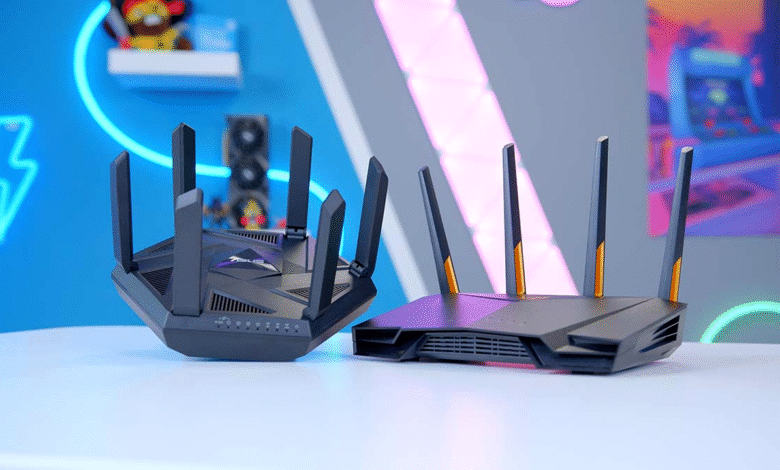How to Choose the Best WiFi Router in 2024

Wi-Fi has become an indispensable part of our daily lives, powering our work, entertainment, and communication needs. As we step into 2024, the need for a reliable and efficient WiFi router is more critical than ever. In this guide, we’ll walk you through the essential factors to consider when choosing the best WiFi router to meet your specific needs.
Read More: How to Build a Home Network: A Step-by-Step Guide
Best WiFi Router in 2024
In the fast-paced world of technology, where everything is interconnected, having a robust WiFi connection is paramount. Whether you’re working from home, streaming your favorite shows, or gaming online, a dependable WiFi router is the backbone of a seamless online experience.
Understanding Your Needs
Assessing Internet Usage
Before diving into the world of WiFi routers, take a moment to evaluate your internet usage. Understanding your data needs will guide you toward the router that best suits your requirements.
If your internet usage is primarily for basic tasks like browsing and emails, a single-band router may suffice. On the other hand, if you engage in bandwidth-intensive activities such as HD streaming or online gaming, a dual-band or tri-band router is a more suitable choice.
Identifying the Number of Connected Devices
In a world dominated by smart devices, the number of gadgets connected to your network matters. Ensure your chosen router can handle multiple connections without compromising on speed or performance. Consider the devices that will be connected, including smartphones, laptops, smart TVs, and smart home devices, to determine the level of connectivity support you need.
Types of WiFi Routers
Single-Band Routers
Single-band routers operate on the 2.4GHz frequency band. These routers are suitable for basic internet usage and are often more budget-friendly. However, they may struggle in environments with a high number of connected devices or in areas with significant interference.
Dual-Band Routers
Dual-band routers operate on both the 2.4GHz and 5GHz frequency bands. This allows for better performance and reduced interference, making them suitable for households with moderate internet usage and multiple devices. They are a good middle-ground option for most users.
Tri-Band Routers
Tri-band routers take it a step further by offering three frequency bands, usually one at 2.4GHz and two at 5GHz. These routers excel in handling high internet traffic and are perfect for larger households with numerous connected devices. They provide better performance and less congestion in data-heavy scenarios.
Speed and Performance
Mbps and Its Significance
Understanding megabits per second (Mbps) is crucial when selecting a router. This metric represents the speed at which data is transferred over the network. Higher Mbps means faster internet speed. Consider your internet activities to determine the Mbps required for optimal performance.
For basic tasks like web browsing and emails, a speed of 25-50 Mbps is sufficient. Streaming HD content or online gaming may require speeds between 50-100 Mbps, while 100 Mbps and above are recommended for 4K streaming and intense online activities.
Choosing the Right Speed for Your Needs
Select a router with a speed that aligns with your internet usage. Overspending on high-speed routers for basic needs is unnecessary, while choosing too low a speed may lead to frustration. Strike a balance by matching the router’s speed with your specific requirements.
Range and Coverage
Importance of Coverage Area
Consider the size of your living space when choosing a router. A good router should cover every nook and cranny, eliminating dead zones and ensuring a consistent connection throughout your home. Factors like walls and obstacles can affect the signal range, so it’s essential to choose a router with adequate coverage for your specific environment.
Overcoming Dead Zones
Invest in a router with features like mesh technology to extend coverage. Mesh routers use multiple devices (nodes) that work together to create a seamless network. This is crucial in overcoming dead zones and providing a stable connection in every corner of your home.
Security Features
WPA3 Encryption
Security is paramount in the digital age, and your WiFi router plays a crucial role in safeguarding your network. Ensure your router supports the latest WPA3 encryption protocol. WPA3 offers enhanced security features, protecting your network from potential threats and unauthorized access.
Firewall Capabilities
A router with robust firewall capabilities adds an extra layer of protection. Look for routers with built-in firewalls to safeguard your connected devices from online threats. The firewall acts as a barrier, monitoring and controlling incoming and outgoing network traffic, enhancing your network’s overall security.
Compatibility
Ensuring Compatibility with Devices
Check if the router is compatible with your devices, especially if you have smart home gadgets. A router that supports a wide range of devices ensures a smooth and hassle-free experience. Compatibility is crucial for optimal performance, so verify that your router works seamlessly with various devices, operating systems, and wireless standards.
Future-Proofing Your Investment
In the rapidly evolving world of technology, it’s essential to future-proof your investment. Choose a router that is compatible with emerging technologies and standards. This ensures that your router remains relevant and efficient as new devices and technologies emerge, extending the lifespan of your investment.
Brand Reputation
Trustworthy Router Manufacturers
The market is flooded with various router manufacturers, each claiming to offer the best product. Stick to reputable brands known for producing reliable routers. Brands like ASUS, TP-Link, Netgear, and Linksys have established themselves as leaders in the industry. Research customer reviews and ratings to gauge the reputation of a router manufacturer.
Customer Reviews and Ratings
Real-world experiences shared by other users can provide valuable insights into the performance and reliability of a router. Look for routers with consistently positive reviews, indicating customer satisfaction. Pay attention to reviews that mention factors relevant to your specific needs, such as speed, coverage, and ease of use.
User-Friendly Interface
Easy Setup and Management
A user-friendly interface is crucial, especially if you’re not tech-savvy. Choose a router with a straightforward setup process and an intuitive management interface. Some routers offer guided setups through mobile apps or web interfaces, making the initial installation and configuration hassle-free.
Mobile App Compatibility
Routers with dedicated mobile apps simplify management. Look for routers that offer mobile app compatibility, allowing you to monitor and control your network effortlessly from your smartphone. Mobile apps often provide real-time insights into connected devices, network speed, and security status, enhancing your overall experience.
Additional Features
Quality of Service (QoS)
Quality of Service (QoS) is a feature that allows you to prioritize specific devices or applications for a better online experience. In a household with multiple users and devices, QoS ensures that critical tasks, such as video conferencing or online gaming, receive priority for smoother performance.
Beamforming Technology
Beamforming is a technology that concentrates the WiFi signal towards connected devices, enhancing speed and reliability. Consider routers equipped with beamforming technology for improved performance, especially in scenarios where devices are spread across different areas of your home.
Budget Considerations
Finding the Right Balance
While it’s tempting to splurge on the latest technology, finding a router that balances features and budget is key. Evaluate your needs and opt for a router that offers the best value for money. Consider the features that are essential for your usage and prioritize those while staying within your budget constraints.
Long-Term Cost-Effectiveness
Consider the long-term costs associated with a router. Investing in a slightly pricier yet durable router can prove cost-effective in the long run. Cheaper routers may need frequent replacements, leading to higher cumulative costs over time. Assess the durability, performance, and future-proofing aspects to make a wise investment.
Warranty and Customer Support
Length of Warranty
The warranty period reflects the manufacturer’s confidence in their product. Choose a router with a substantial warranty, providing peace of mind and protection against potential issues. A longer warranty period indicates that the manufacturer stands behind the quality and durability of their router.
Assessing Customer Support Services
Reliable customer support is crucial in troubleshooting issues and seeking assistance when needed. Research the customer support services offered by the router manufacturer. Look for prompt and responsive customer support that can address any concerns or technical issues you may encounter during the router’s lifespan.
Latest Technological Trends
WiFi 6 Capabilities
WiFi 6 is the latest standard in wireless technology, offering improved speed, capacity, and efficiency. Routers with WiFi 6 capabilities provide a more reliable and faster connection, especially in environments with numerous connected devices. Consider routers with WiFi 6 capabilities for a future-proof investment, ensuring your network remains competitive in the evolving technological landscape.
Artificial Intelligence in Routers
Some routers incorporate artificial intelligence (AI) to optimize performance based on usage patterns. AI-driven routers can adapt to your specific needs, providing an intelligent and efficient network experience. While not a necessity, routers with AI capabilities offer a forward-looking approach to network management and can enhance the overall user experience.
Making the Final Decision
Weighing Pros and Cons
Carefully review the features and drawbacks of each router. Consider your specific needs, budget, and the long-term benefits offered by each option. Prioritize the features that align with your requirements and make an informed decision that caters to your unique situation.
Final Considerations Before Purchasing
Before making the final decision, double-check compatibility, warranty, and customer support. Ensure the chosen router aligns perfectly with your requirements and future expectations. Taking the time to make an informed decision now will save you from potential headaches and connectivity issues in the future.
Conclusion
Choosing the best WiFi router in 2024 involves a comprehensive understanding of your needs and careful consideration of various factors. By evaluating speed, coverage, security, and additional features, you can make an informed decision that ensures a seamless and reliable online experience.
Read More: How to Set Up and Use a Virtual Private Network (VPN)
FAQs
- Is WiFi 6 worth the investment in 2024? Absolutely. WiFi 6 offers improved speed and efficiency, making it a worthwhile investment for future-proofing your network.
- Do all routers support the latest WPA3 encryption? No, not all routers support WPA3. It’s essential to check the specifications of the router and ensure it includes the latest security protocols.
- Can I use a dual-band router for gaming purposes? Yes, a dual-band router can provide sufficient speed and performance for gaming, but for a more optimal experience, consider a tri-band router.
- How do I extend the coverage of my WiFi router? Consider routers with mesh technology or invest in WiFi extenders to eliminate dead zones and extend coverage.
- What role does QoS play in a WiFi router? Quality of Service (QoS) allows you to prioritize specific devices or applications, ensuring a better online experience for critical tasks.







